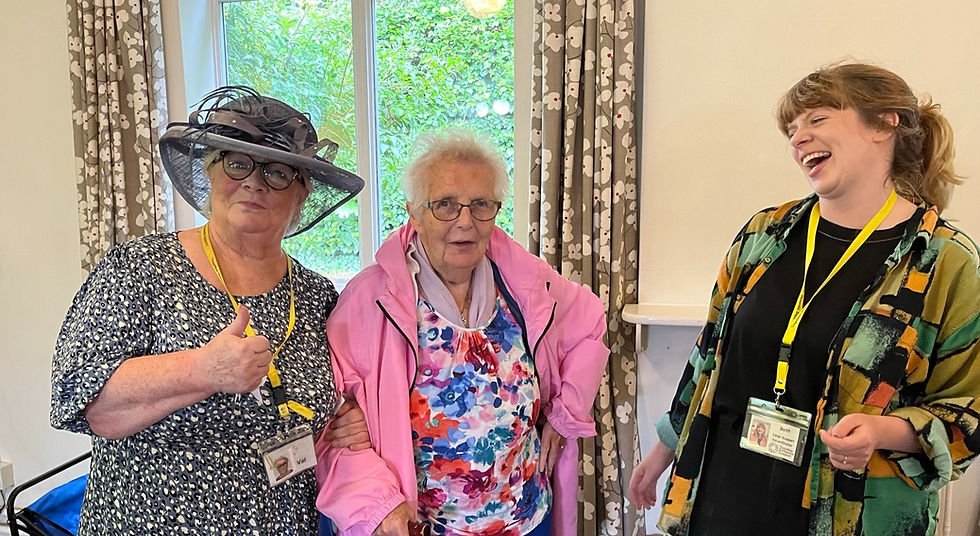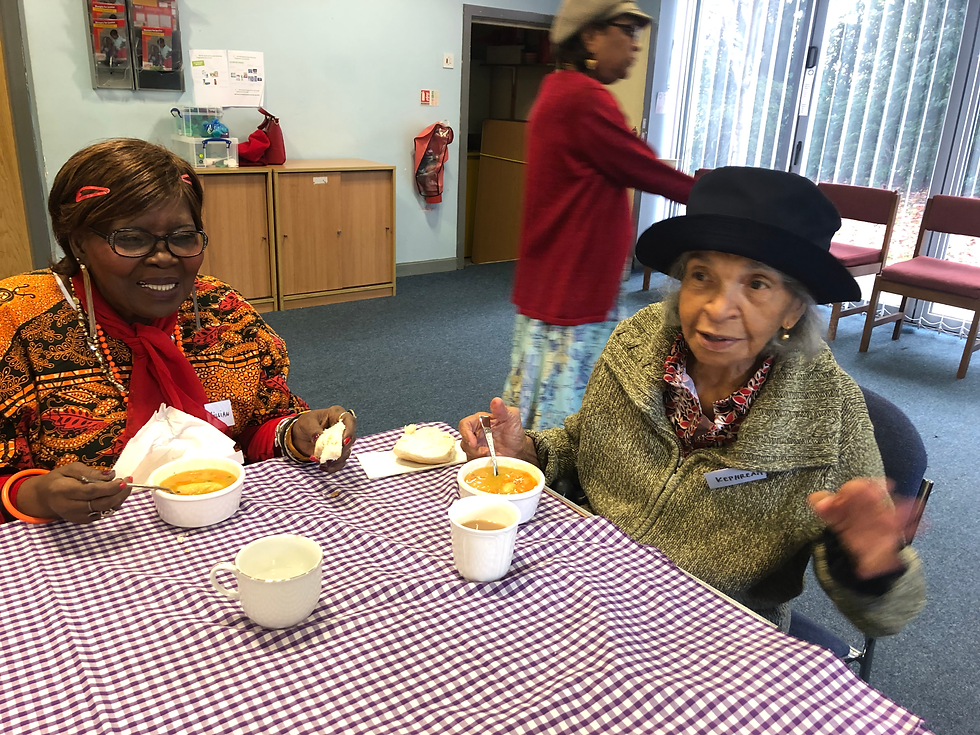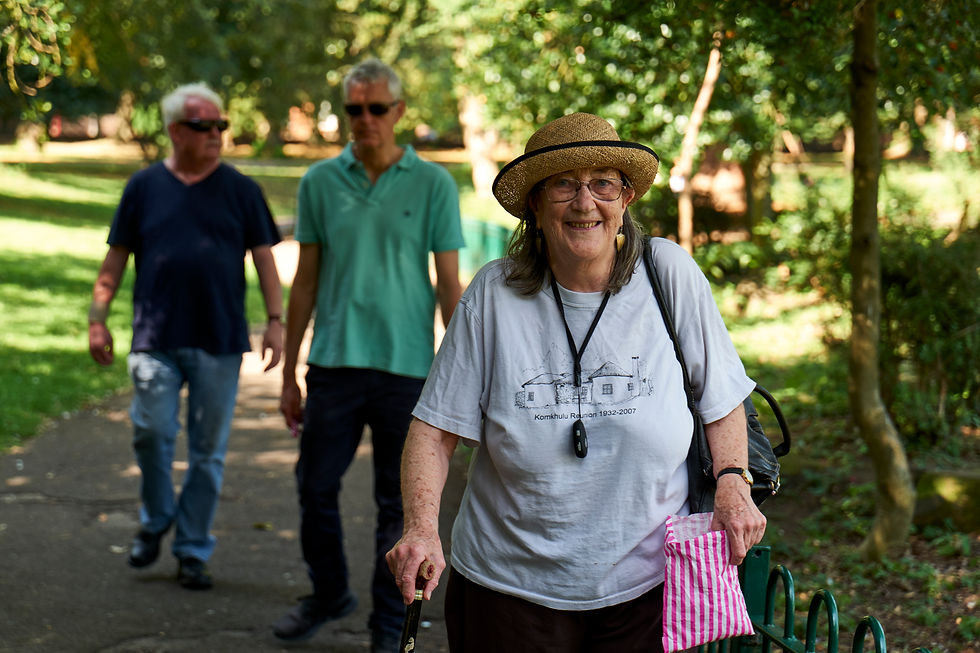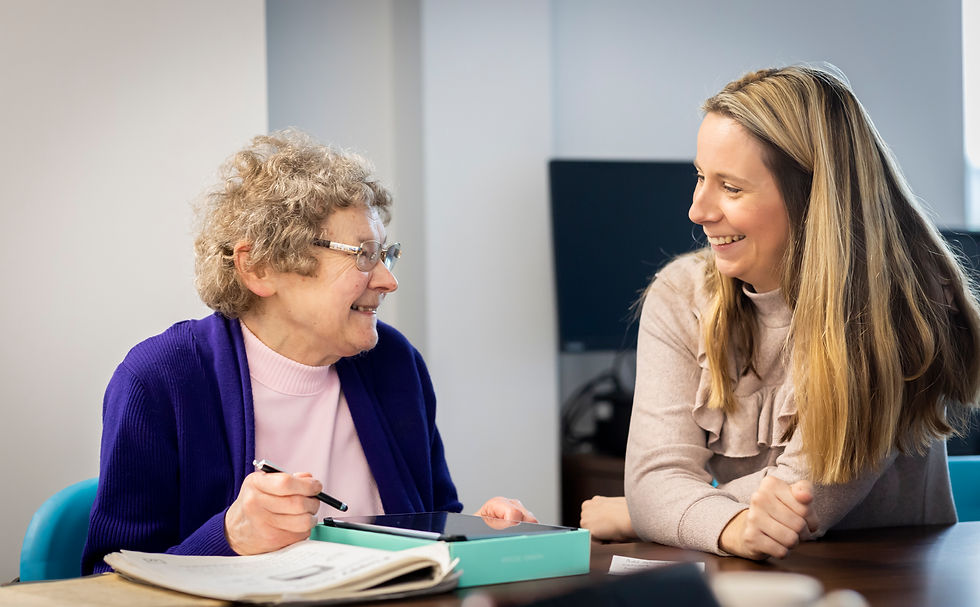7 Top tips for dementia carers
- sally8553
- Sep 16, 2024
- 5 min read
Updated: Sep 18, 2024

Caring for someone living with dementia can be frustrating, but there are some simple things to remember that can make life easier for both you and the person you care for.
1. Memory Prompts

Memory prompts can be as simple as reminding someone to eat, get washed, or get dressed. Other common reminders include labelling cupboards with important contents, such as tea, coffee, sugar or cups. This gives as person living with dementia a certain amount of independence as they may be able to make a cup of tea without feeling distressed or disoriented.
It is also possible to buy or make daily or weekly charts where you can fill in any activities or appointments that have been scheduled for the week. They need to be quite visible and put in such a place that they are easily seen.
In the later stages it will be necessary to remind a person living with dementia of any appointments and accompany them on their visits. In such cases, it is a good idea to write down any questions or concerns beforehand that you may want to ask.
Another useful prompt is to put a poster by the front door with things to remember to take before leaving. This would include keys, phone and purse, for example, and a contact list in case they become disoriented when out and might need help to get home. A telephone number would suffice rather than an address to avoid anyone taking advantage of the situation.
2. Getting up in the morning: bathing and dressing

In the early stages of dementia it may be sufficient to remind someone to get up, washed and dressed. A reminder on the bathroom door to wash and clean teeth may work. As the dementia journey progresses it is likely that the person living with dementia will need help with personal hygiene and getting dressed.
Fiddly buttons and ties can present a problem when dressing. For everyday living, elasticated waisted trousers make dressing and going to the toilet easier. Velcro fastenings on shoes also enable independent dressing. When shaving becomes a problem, a beard is a reasonable option for men.
Putting tights on can also be challenging, particularly where mobility and bending is an issue, so a sock aid and long-handled shoe horn might be useful.
3. Food and drink

If the person living with dementia lives alone, but would struggle to cook full meals from scratch, there are a number of companies that provide well-balanced meals that can be popped in the microwave either by the person themselves or a carer.
They provide a range of tasty meals with vetegarian, vegan and gluten free options. Some, like Oakhouse Foods, will even place them in the fridge or freezer when they deliver and they are designed to be cooked from frozen so there are no worries about having to defrost them before cooking. Wiltshire Farmfoods provide a similar service, with lots of tasty options.
Of course, ready meals can also be ordered through supermarkets if that is easier.
Hot drinks can be made by a carer and put in a thermos cup to keep warm. These are readily available and inexpensive.
4. Around the house

As housework becomes more difficult, paying a cleaner is a good option for keeping the home clean and tidy. Manchester is fortunate that we have access to the Care & Repair service who will come and do any odd jobs and minor adaptations around the home - such as changing lightbulbs or smoke alarm batteries. Their services are free but donations are welcome.
5. Shopping

Online shopping, particularly for food, means that a carer can sort out a week's shopping from the comfort of their armchair. This will become increasingly important as a person living with dementia may struggle doing their own shopping, forget what they wanted to buy, or have difficulty managing money or cards.
They may still enjoy going to the shops and wandering around in your company, and if the shops are local the shop assistants may get to know them and keep a friendly eye out.
6. Prepare with the Herbert Protocol

There are some key documents everyone should have in place to help ensure the health, wellbeing and safety of a person living with dementia.
You should get your Herbert Protocol form completed as soon as possible. This will be very important should the person you care for go missing or get lost. The Protocol consists of the Herbert Protocol form which should be handed to the police as soon as you are aware a person is missing. It is complete with a recent photograph of the person and vital information that may help locate them.
The initiative is named after George Herbert, who was a veteran of the Normandy landings and lived with dementia. George died whilst 'missing', trying to find his childhood home.
You will need to:
Download the form using the link below
Print off a copy and fill in every detail you can
Attach a recent photograph to the form
Store it securely
In the event you need to report your love one missing, make sure that when you tell the police about your form when you call them. They will instruct you whether to take it to a police station or hand it to a visiting officer.
If you are unable to print your copy of the Herbert Protocol form at home, let us iknow and we can post one out to you.
7. Get a Lasting Power of Attorney in place

Many people have heard about 'Lasting Power of Attorney', but most people don't start thinking about getting one until it is very much needed. It is more difficult to get an LPA in place when a person's cognitive ability is compromised, so the earlier it is done the better.
Lasting Power of Attorney is a document that needs to be notorised by a solicitor and enables a person to make decisions on behalf of another person. There are two types of LPA: financial & legal, and health & wellbeing. The appointed person(s) can only make decisions within the scope of the LPA in place, so if a person has a financial & legal LPA, they cannot make health decisions and vice versa.
If an LPA for health is not in place, a doctor can make the decision about what is best for a person without the consent on their family or Next of Kin. They will consult with a Next of Kin, but ultimately the decision would be made by a doctor or healthcare professional. This can often lead to court intervention as families try to keep control of their loved one's care.
Getting an LPA in place early, when the a person can demonstrate they fully understand what an LPA is and the decisonmaking power they are delegating, can avoid this situation.
If a diagnosis of dementia or mild cognitive impairment has already been made, it is advisable to get a fully consulted LPA, with a face-to-face appointment with a solicitor, as LPAs completed online post-diagnosis may be cheaper but are much more easily contested.
If you need advice about setting up a Lasting Power of Attorney, you can book an appointment at one of our TDS Legal Clinics. You will be able to discuss your individiual needs with a solicitor from our partners, Private Client Solicitors, and as a TDS Legal Clinic attendee you will be entitled to a deep discount of up to 50% off their usual LPA fees.
TDS Legal Clinics happen on the third Thursday of each month. Click here to view our next clinic date and book your appointment today.
Thank you for reading. We are a small charity and depend on donations in order to continue providing our services for people living with dementia and their carers in Manchester.
We are the only providers of holistic, post-diagnosis dementia services in the city region, and neither Manchester City Council or our local NHS Trust commissions post-diagnostic services. If you found this article useful, please consider a donation of £1 to help us continue our vital work.






Comments